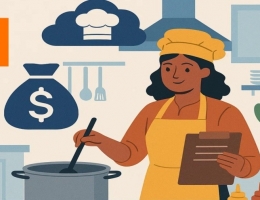
Brewing Success: How MSMEs Can Tap Into India's Growing Coffee Ecosystem
Why Coffee? $1.8 Billion Export Surge!
India's coffee sector is experiencing remarkable growth, presenting lucrative opportunities for Micro, Small, and Medium Enterprises (MSMEs). With coffee exports surging 40.37% to $1.8 billion in 2024-25 from $1.29 billion in 2023-24, the industry is witnessing unprecedented expansion. The operationalization of the India-European Free Trade Association (EFTA) pact from Monday further strengthens this momentum, making Indian coffee competitive across Norway, Switzerland, Iceland, and Liechtenstein. As Commerce Secretary Rajesh Agrawal emphasized during the Coffee Board expo, value addition in coffee is transforming the landscape, with entrepreneurs increasingly entering specialized segments like instant coffee and specialty coffee. MSMEs can strategically position themselves across the entire coffee value chain, from cultivation and processing to roasting, packaging, and retail, capturing both domestic and international market opportunities.
How to Register & Get Government Support?
Aspiring MSME entrepreneurs can enter the coffee business through structured government support. The first step involves registering your enterprise through the Udyam Registration portal (https://udyamregistration.gov.in), which provides official MSME status and access to various schemes. The Coffee Board of India (https://coffeeboard.gov.in) offers comprehensive guidance on coffee cultivation, processing standards, and quality certifications. For financial assistance, entrepreneurs should explore the CGTMSE scheme through https://www.cgtmse.in, which provides collateral-free credit guarantees up to ₹5 crore. Additionally, the Ministry of MSME's portal (https://msme.gov.in) details sector-specific schemes, subsidies, and training programs. Entrepreneurs should also register with the Spices Board for export-related certifications and connect with the Agricultural and Processed Food Products Export Development Authority (APEDA) at https://apeda.gov.in for accessing international markets and understanding export protocols.
What Challenges Will You Face & Solutions?
MSMEs entering the coffee sector face several challenges, but practical solutions exist. Quality consistency remains paramount but can be hindered by not investing in proper storage facilities and not partnering with Coffee Board-certified processing units to maintain standards. Market competition from established players can be intense. Although focusing on niche segments like organic coffee, single-origin varieties, or specialty blends will command premium pricing. Access to raw materials at competitive prices poses difficulty but treasure lies in establishing direct relationships with coffee growers through farmer-producer organizations or cooperatives. Export compliance and documentation complexity often overwhelm new entrepreneurs and the solution is to utilize APEDA's export facilitation services and participate in Coffee Board training programs. Initial capital requirements can be substantial but this can be tackled by leveraging government schemes like PMEGP and exploring angel investors interested in agribusiness ventures.
Your Growth Roadmap: EFTA & Beyond!
The outlook for coffee MSMEs appears exceptionally promising. India's position as the seventh largest coffee producer globally, with domestic consumption doubling in recent years, creates a robust foundation. The EFTA pact and upcoming India-EFTA Trade and Economic Partnership Agreement (TEPA) will open European markets, where India's EFTA member countries consume about 3% of global coffee imports valued at $175 million. The domestic market shows equally strong potential, with a fast-rising middle class driving increased coffee consumption beyond traditional markets. Entrepreneurs who embrace sustainability practices, invest in quality, and diversify their product offerings across instant coffee, specialty blends, and ready-to-drink formats will find substantial growth opportunities in this expanding ecosystem.











